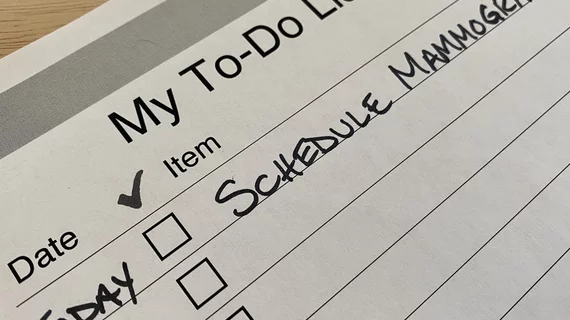Patients miss nearly 24% of outpatient imaging appointments, with most due to cancellation
Patients miss nearly 24% of outpatient imaging appointments with the majority due to cancellation, according to new research published May 4 in Academic Radiology [1].
Less than 2% of such misses were classified as no-shows while the other 22% were due to patients calling off. Several sociodemographic factors appear to make individuals more likely to miss an imaging appointment, researchers with the University of California, Irvine, found. Those include patients who are younger, unwed, live in disadvantaged neighborhoods, or lack adequate insurance.
“While patients miss their appointments for various reasons, from an institutional standpoint, interventions are needed to limit the number of no-shows and cancellations, specifically those too close to the appointment that cannot be filled with another patient,” UCI radiologist and corresponding author Gelareh Sadigh, MD, and colleagues advised. “This will improve patient outcomes and rescue missed revenues.”
For the single-center study, researchers gathered data from all adult outpatient radiology appointments logged at their tertiary academic health center in 2022 and January 2023. Out of nearly 81,000 advanced imaging exams scheduled by 32,000 patients during the study period, 76% were completed. Of the balance, almost 17,700 exams (or 21.9%) were canceled, while patients failed to show up for nearly 1,600 (1.9%) more.
Among cancellations, over 70% were initiated by the healthcare consumer. Being over 65 “significantly” decreased the probability of a missed appointment (by 5.4 percentage points) or no-show (4.2 percentage points). Meanwhile, being single increased the probably of missed appointments (2.2 PP) and no-shows (2.6 PP). Patients with public insurance or no health plan also were likelier (by 1.3-4.9 PP) to miss appointments or fail to show up (2.2-7.6 PP) than those with commercial insurance. Living in a disadvantaged neighborhood also increased the likelihood of missing an appointment (4.9 PP) and they were more likely to do so at the last minute.
There is limited research on how to reduce appointment cancellations in outpatient imaging, Sadigh et al. noted. Self-scheduling is one intervention, though previous research from UCI found patients more likely to reschedule these exams, due to the flexibility in finding another time slot.
“Having a checklist by the ordering provider or the imaging scheduler of tests or processes needed prior to an imaging exam may also be useful in decreasing cancellations. Lastly, addressing health-related social risks such as transportation access can reduce cancellations,” the authors advised. “Some practices have also implemented overbooking their appointments to decrease lost revenue,” they added later. “Given that the rates of no-shows and same-day cancellations in our institution were less than 10%, we have not implemented overbooking at our institution.”
Read much more, including potential study limitations, at the link below.

